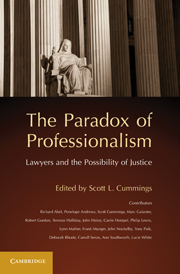Book contents
- Frontmatter
- Contents
- List of Tables and Figures
- Contributors
- Preface and Acknowledgments
- 1 Introduction
- PART I LAWYERS AND THE PUBLIC GOOD: THE FUNDAMENTAL DILEMMA
- PART II LAWYERS AND THEIR CLIENTS: DETERMINANTS OF ETHICAL PRACTICE
- PART III LAWYERS AND SOCIAL CHANGE: MOBILIZING LAW FOR JUSTICE
- 14 Epilogue
- Index
- References
1 - Introduction
What Good Are Lawyers?
Published online by Cambridge University Press: 05 June 2012
- Frontmatter
- Contents
- List of Tables and Figures
- Contributors
- Preface and Acknowledgments
- 1 Introduction
- PART I LAWYERS AND THE PUBLIC GOOD: THE FUNDAMENTAL DILEMMA
- PART II LAWYERS AND THEIR CLIENTS: DETERMINANTS OF ETHICAL PRACTICE
- PART III LAWYERS AND SOCIAL CHANGE: MOBILIZING LAW FOR JUSTICE
- 14 Epilogue
- Index
- References
Summary
INTRODUCTION
What good are lawyers? It depends, of course, on whom you ask. Most Americans are ambivalent: When they are in need of help, they call a lawyer – and when they do, they are, more often than not, happy with the services that their lawyers provide. Nonetheless, Americans generally hold lawyers as a group in low repute, suspecting that they are more concerned with collecting fees than serving the public good.
This public cynicism reflects a fundamental paradox at the heart of the legal profession. The very notion that lawyers are members of a “profession” suggests a delicate balance of incentives and duties that pull in different directions. In the United States (as in most countries), lawyers are freely engaged in the commercial enterprise of rendering services for a fee. They are permitted – and indeed encouraged – to make money, often lots of it, within the boundaries of broad rules, such as those limiting overly aggressive (or misleading) solicitation and advertising. As professionals, they are accorded wide discretion to define their own standards for admission and rules of conduct in order to promote craft expertise and quality service. In exchange for this privilege, lawyers are expected to embrace a set of public values – a code of “professionalism” defined by a commitment to competence, independence, and public service – distinguishing them from “mere” commercial actors. They are asked, in short, to be “public citizens” with a special obligation to promote the “administration of justice.”
- Type
- Chapter
- Information
- The Paradox of ProfessionalismLawyers and the Possibility of Justice, pp. 1 - 28Publisher: Cambridge University PressPrint publication year: 2011
References
- 2
- Cited by



